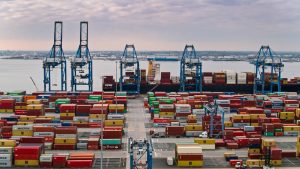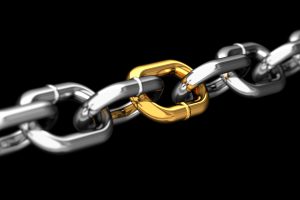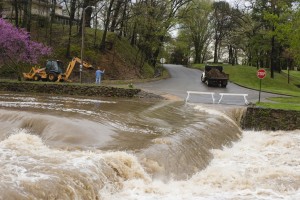 In the early morning of March 26, 2024, a cargo ship estimated to weigh more than 100,000 tons catastrophically struck the 1.6-mile-long Francis Scott Key Bridge while departing the Port of Baltimore. This led to fatalities and interruptions to the major maritime artery into and out of the port city. Not only did 31,000 vehicles cross this bridge each day, the now blocked Baltimore port handled 52.3 million tons of foreign cargo worth nearly $81 billion in 2023 and is responsible for more than 15,000 jobs.
In the early morning of March 26, 2024, a cargo ship estimated to weigh more than 100,000 tons catastrophically struck the 1.6-mile-long Francis Scott Key Bridge while departing the Port of Baltimore. This led to fatalities and interruptions to the major maritime artery into and out of the port city. Not only did 31,000 vehicles cross this bridge each day, the now blocked Baltimore port handled 52.3 million tons of foreign cargo worth nearly $81 billion in 2023 and is responsible for more than 15,000 jobs.
Articles Posted in Contingent Business Interruption
Plight of Ever Given Reminds Policyholders to Reevaluate Insurance Programs for Loss and Delay in Transit of Goods
 A few weeks have passed since the Suez Canal was cleared of the now infamous Ever Given, the quarter-mile-long, 220,000-ton cargo ship that ran aground, clogging one of the world’s most crucial shipping arteries for over six days. For almost a week, the world was captivated by an 869-foot-wide portion of the historic canal built in 1869 to connect the Mediterranean Sea to the Red Sea through the Isthmus of Suez. Ordinary people from all walks of life instantly became armchair marine engineers, nautical scientists and tugboat captains, offering advice on how to free the ship in a matter of minutes, while hundreds of massive cargo vessels sat stranded at either end of the canal. Finally, on March 29, 2021, after around-the-clock efforts by international teams, salvage crews extricated the ship, allowing the rest of us to turn (reluctantly) back to our day jobs.
A few weeks have passed since the Suez Canal was cleared of the now infamous Ever Given, the quarter-mile-long, 220,000-ton cargo ship that ran aground, clogging one of the world’s most crucial shipping arteries for over six days. For almost a week, the world was captivated by an 869-foot-wide portion of the historic canal built in 1869 to connect the Mediterranean Sea to the Red Sea through the Isthmus of Suez. Ordinary people from all walks of life instantly became armchair marine engineers, nautical scientists and tugboat captains, offering advice on how to free the ship in a matter of minutes, while hundreds of massive cargo vessels sat stranded at either end of the canal. Finally, on March 29, 2021, after around-the-clock efforts by international teams, salvage crews extricated the ship, allowing the rest of us to turn (reluctantly) back to our day jobs.
Getting Ahead of the Coronavirus Epidemic: What It Means for Insuring Your Business
 There has been a drumbeat of news reports about Wuhan, China, a city more populous than any in the United States, which is in effective lock-down because of the coronavirus. Foreign nationals are being evacuated, travel has been restricted, and business is at a standstill. At a time like this, preserving public health is the highest priority. But businesses, both local and global, are also affected by shut-down orders, disruptions to their supply chains, mass sick days, and loss of business. Many, especially providers of hospitality or health care, may face elevated liability risks for exposing others to a contagion. It is important to remember that insurance may be available to meet these risks.
There has been a drumbeat of news reports about Wuhan, China, a city more populous than any in the United States, which is in effective lock-down because of the coronavirus. Foreign nationals are being evacuated, travel has been restricted, and business is at a standstill. At a time like this, preserving public health is the highest priority. But businesses, both local and global, are also affected by shut-down orders, disruptions to their supply chains, mass sick days, and loss of business. Many, especially providers of hospitality or health care, may face elevated liability risks for exposing others to a contagion. It is important to remember that insurance may be available to meet these risks.
The Insurance Implications of Hurricane Season Should Be a Concern Year Round
Hurricane Barry provides the latest reminder of insurance precautions that should always be top of mind for business owners in coastal areas. In “Hurricane Barry: Prepare Now to Maximize Insurance Recoveries,” colleagues Tamara D. Bruno, David F. Klein, Joseph D. Jean and Vincent E. Morgan provide a list of helpful reminders and immediate and proactive steps one should take to maximize insurance recovery before, during and after a tropical storm or hurricane makes landfall.
Natural Disaster Necessities: Property Damage, Business Interruption and CBI Coverage
Volcanoes, hurricanes, and polar vortexes—oh, my! From the ongoing eruption of the Kilauea volcano in Hawaii, to huge winter storms, massive mudslides, and the unfortunately reliable hurricane season, it seems like natural disasters have been near constant over the past year. In addition to the catastrophic toll these events take on people and communities, the toll on a business can be high. Understanding the full range and implications of your company’s risks, and putting the right coverage in place to protect against those risks, is vital. When a natural disaster strikes, having appropriate levels of property damage, business interruption and contingent business interruption insurance can be three keys to stability.
season, it seems like natural disasters have been near constant over the past year. In addition to the catastrophic toll these events take on people and communities, the toll on a business can be high. Understanding the full range and implications of your company’s risks, and putting the right coverage in place to protect against those risks, is vital. When a natural disaster strikes, having appropriate levels of property damage, business interruption and contingent business interruption insurance can be three keys to stability.
Hurricane Harvey and Irma: Is Your Company Prepared for a Disaster?
An unexpected or catastrophic loss can force any company out of business, even if it is insured. You must understand your company’s risks and how your insurance policies cover those risks in order to manage them and maintain stability.
Having the correct insurance in place is only the first step. Property and business interruption insurance policies are often complex, and your suppliers, customers and other business partners’ insurance situation may have a direct impact on you as well. Even if your business doesn’t suffer any direct physical damage to its facilities following a natural disaster or other loss, your customers or suppliers may have, and that could result in what is known as a “supply chain” or “contingent business interruption” loss of revenue and sales. If you are unprepared when a disaster strikes, you may miss out on substantial amounts of insurance coverage to which you may be entitled. The time to prepare is before a disaster occurs. Take the time now to understand your insurance coverage and other risk transfer methods and opportunities. Know your rights. And put a plan in place to protect yourself, your employees, and your property before the loss occurs. Then, if disaster strikes, you’ll be in a better position to make it through and to access your insurance coverage to help restore operations.
Eliminate the Weak Link in Your Supply Chain with CBI Insurance Coverage
Business Interruption insurance provides the policyholder with important peace of mind—it covers lost business arising from unexpected damage to the policyholder’s property. But what if the damage isn’t to the policyholder’s own property—what if the losses arise because of damage a supplier or customer suffers? When a link in your supply chain breaks, Contingent Business Interruption or “CBI” coverage can step in to replace it.
CBI coverage, like Business Interruption coverage, is a property insurance extension that addresses lost income suffered due to an interruption of business. Instead of focusing on loss or damage suffered by the insured on its own property, however, CBI coverage addresses “contingent” losses, or losses that involve suppliers or customers. A CBI loss is a loss that results from damage to a supplier or customer that prevents the supplier from providing its goods or services to a policyholder or prevents a customer from receiving the policyholder’s goods or services. This coverage is crucial for policyholders whose business depends upon supply chains, customers or other “streams of commerce” for commercial success. Over the past few years, we’ve seen a spike in the number of CBI claims made by policyholders. During the same timeframe, however, we’ve also seen an increase in the number of coverage disputes related to CBI coverage. Although the concept is fairly straightforward, recovering for CBI losses often isn’t.
When Spring Showers Bring Floods: Insurance Recovery Tips for Businesses
Spring brings warmer weather and a welcome return to green after winter gray. But spring can sometimes go too far, with rain that escalates into destructive floods. As floodwaters recede and cleanup begins,  obtaining insurance proceeds and FEMA assistance are critical and immediate steps to recovery. The following practices can help maximize your recovery. Continue Reading ›
obtaining insurance proceeds and FEMA assistance are critical and immediate steps to recovery. The following practices can help maximize your recovery. Continue Reading ›
 Policyholder Pulse
Policyholder Pulse


